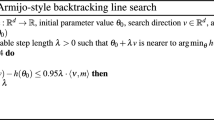Abstract
Several extremum problems in Statistics and Artificial Intelligence, e.g., likelihood maximization, are often solved by iterative algorithms such as iterative scaling or the EM algorithm, admitting an intuitive “geometric” interpretatation as iterated projections in the sense of Kullback information divergence. Such iterative algorithms, including those using Bregman rather than Kullback divergences, will be surveyed. It will be hinted to that the celebrated belief propagation (or sum-product) algorithm may also admit a similar interpretation.
Similar content being viewed by others
Author information
Authors and Affiliations
Editor information
Editors and Affiliations
Rights and permissions
Copyright information
© 2008 Springer Berlin Heidelberg
About this paper
Cite this paper
Csiszár, I. (2008). On Iterative Algorithms with an Information Geometry Background. In: Jean-Fran, JF., Berthold, M.R., Horváth, T. (eds) Discovery Science. DS 2008. Lecture Notes in Computer Science(), vol 5255. Springer, Berlin, Heidelberg. https://doi.org/10.1007/978-3-540-88411-8_1
Download citation
DOI: https://doi.org/10.1007/978-3-540-88411-8_1
Publisher Name: Springer, Berlin, Heidelberg
Print ISBN: 978-3-540-88410-1
Online ISBN: 978-3-540-88411-8
eBook Packages: Computer ScienceComputer Science (R0)




